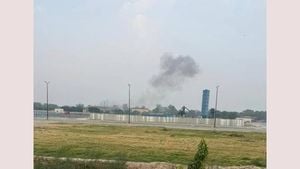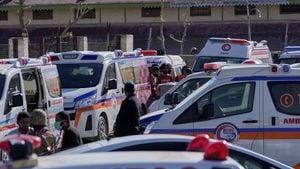In a significant development in the ongoing conflict between Russia and Ukraine, both nations executed a prisoner exchange on May 6, 2025, with each side returning 205 captured soldiers. This marked the fifth prisoner swap of the year and the 64th since the onset of Russia's full-scale invasion in February 2022. The exchange was facilitated by the United Arab Emirates, underscoring the nation’s role as a mediator in the protracted conflict.
Ukrainian President Volodymyr Zelenskyy announced the successful return of the Ukrainian soldiers via a post on the Telegram app. "Today, Ukraine has brought back 205 warriors," he stated, expressing gratitude towards the UAE for their assistance in the negotiations. Zelenskyy emphasized the diverse backgrounds of the returned soldiers, noting they included young men and older individuals from various branches of the military. "Our people are free. Our people are home," he added, highlighting the emotional significance of the exchange for the families involved.
On the Russian side, the Defense Ministry confirmed the return of 205 Russian servicemen in exchange for their Ukrainian counterparts. Tatiana Moskalkova, Russia’s human rights ombudsman, expressed gratitude towards the defense ministry and other involved agencies, stating, "For many families, today has become a celebration of reunification - anxiety and uncertainty have given way to the joy of a loved one returning home." This sentiment reflects the profound impact such exchanges have on the lives of families affected by the war.
The prisoners exchanged included 202 enlisted men and three officers from Ukraine’s military and national guard. The Ukrainian prisoners had been held in various locations across Russia, enduring conditions that President Zelenskyy described as designed to "torment them and destroy their humanity." This stark portrayal of their experiences underscores the harsh realities faced by prisoners of war.
The prisoner swap comes on the heels of a larger exchange that took place on April 19, 2025, when 277 Ukrainian soldiers were returned ahead of the Easter holiday. These exchanges have become a crucial aspect of the ongoing conflict, as both sides continue to negotiate for the release of their captured personnel.
While the recent exchange is a cause for celebration, it also highlights the ongoing plight of thousands of individuals still detained. According to Ukrainian Ombudsman Dmytro Lubinets, over 16,000 Ukrainian civilians remain imprisoned in Russia. This staggering figure raises questions about the future of prisoner exchanges and the possibility of broader negotiations for peace.
In 2024, Ukraine proposed an all-for-all exchange of prisoners, but this offer was rejected by Moscow, indicating the complexities and challenges that lie ahead in resolving the conflict. The situation remains fluid, with both sides continuing to engage in military operations and strategic maneuvers.
As the war drags on, the humanitarian aspects of the conflict are increasingly coming to the forefront. The emotional toll on families separated by war is profound, and each successful exchange brings a glimmer of hope amidst the chaos. The role of international mediators like the UAE is becoming increasingly vital as both sides seek to navigate the turbulent waters of diplomacy.
In addition to the prisoner exchanges, the broader geopolitical landscape continues to evolve. U.S. President Donald Trump recently commented on the shifting dynamics of the conflict, suggesting that declining oil prices may have made Russia more amenable to negotiations. "I think Russia, with the price of oil right now, oil has gone down, we are in a good position to settle, they want to settle. Ukraine wants to settle," he stated, reflecting a perspective that emphasizes the economic underpinnings of the conflict.
As Poland prepares for presidential elections on May 18, discussions surrounding social policy, migration, and national security are expected to shape the nation’s political trajectory. The outcomes of these elections could have implications for the regional response to the ongoing conflict in Ukraine.
Meanwhile, reports indicate that Russia is employing aggressive tactics, including unauthorized airspace incursions and close encounters with NATO vessels, raising concerns about the potential for escalation. The situation remains particularly tense in contested areas like Pokrovsk, where Russian forces have concentrated their offensive efforts since March.
In the backdrop of these military maneuvers, the humanitarian situation continues to deteriorate. The plight of civilians caught in the crossfire is often overshadowed by the political and military narratives, yet their experiences are crucial to understanding the full impact of the war.
As the conflict enters its third year, the need for a comprehensive resolution becomes increasingly urgent. The recent prisoner exchange serves as a reminder of the human cost of war and the ongoing efforts to bring loved ones home. Each successful return is a testament to the resilience of families and the enduring hope for peace.
Looking ahead, the international community will be watching closely as both Russia and Ukraine navigate the complexities of diplomacy and warfare. The role of mediators like the UAE could prove pivotal in facilitating future exchanges and fostering dialogue between the warring parties.
Ultimately, while the recent exchange of prisoners offers a moment of relief, it also underscores the ongoing challenges and uncertainties that lie ahead. The path to peace remains fraught with obstacles, but each step taken towards reconciliation is a step worth celebrating.




